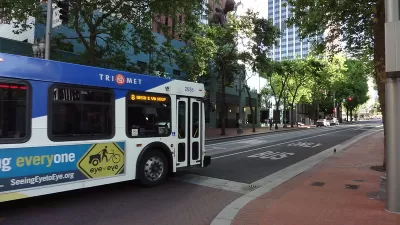Orange County provides the latest development in the ongoing experiment with transit in Southern California, hoping that a high-frequency bus grid can reverse slumping ridership numbers.
Meghan McCarty reports on recent developments in the bus transit planning arena in Orange County, California.
According to McCarty, "Orange County has seen among the biggest drops in ridership within the region, recording about a 30 percent decrease since 2008." (Similar news about declining transit ridership recently focused on Los Angeles, but Orange County is faced with similar trends. Be sure to read the comments of the earlier story for commentary on the data used to create the story.)
Earlier in November, however, the Orange County Transportation Authority (OCTA) proposed an overhaul of the system based on the Houston examples of "increasing frequency for popular lines while reducing or cutting others altogether," as McCarty wrote at the time of the proposal's release to the public.
Fast forward to February, and OCTA officials have revised the November proposal due to public outcry. Here McCarty describes the changes made to the original plan: "In response to the public outcry, officials have proposed a new plan that restores service to 14 lines that would have been cut. But to keep the budget on track, the plan also scales back some of the increases in service proposed for other lines."
FULL STORY: Updated Orange County bus plan proposed after public outcry over cuts

Planetizen Federal Action Tracker
A weekly monitor of how Trump’s orders and actions are impacting planners and planning in America.

Restaurant Patios Were a Pandemic Win — Why Were They so Hard to Keep?
Social distancing requirements and changes in travel patterns prompted cities to pilot new uses for street and sidewalk space. Then it got complicated.

Maui's Vacation Rental Debate Turns Ugly
Verbal attacks, misinformation campaigns and fistfights plague a high-stakes debate to convert thousands of vacation rentals into long-term housing.

In California Battle of Housing vs. Environment, Housing Just Won
A new state law significantly limits the power of CEQA, an environmental review law that served as a powerful tool for blocking new development.

Boulder Eliminates Parking Minimums Citywide
Officials estimate the cost of building a single underground parking space at up to $100,000.

Orange County, Florida Adopts Largest US “Sprawl Repair” Code
The ‘Orange Code’ seeks to rectify decades of sprawl-inducing, car-oriented development.
Urban Design for Planners 1: Software Tools
This six-course series explores essential urban design concepts using open source software and equips planners with the tools they need to participate fully in the urban design process.
Planning for Universal Design
Learn the tools for implementing Universal Design in planning regulations.
Heyer Gruel & Associates PA
JM Goldson LLC
Custer County Colorado
City of Camden Redevelopment Agency
City of Astoria
Transportation Research & Education Center (TREC) at Portland State University
Camden Redevelopment Agency
City of Claremont
Municipality of Princeton (NJ)



























